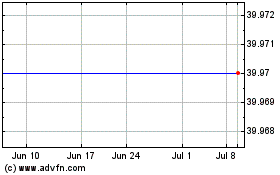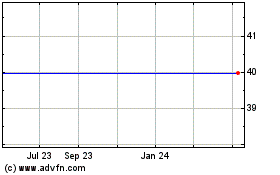Fed Rate Cuts Put Pressure on Electronic Brokers
September 29 2019 - 1:47PM
Dow Jones News
By Lisa Beilfuss
Depending on where you turn, it can seem as though it costs
almost nothing to buy and sell stocks, invest in exchange-traded
funds and even get financial advice.
But some of the juice behind the intensifying price war under
way across the brokerage industry is drying up. Electronic brokers
in recent years have become more reliant on their banking arms,
which effectively subsidize low trading and investing fees. A key
element of the business model was rising interest rates, but a flip
in Federal Reserve policy this year to cutting them has changed the
equation for e-brokers.
"Their fate largely rests with what the Fed decides to do," said
Steven Chubak, a brokerage analyst at Wolfe Research.
Mr. Chubak and others said it will be hard for online brokers to
walk back the deep discounts customers have grown used to. For now,
they are culling expenses.
Charles Schwab Corp. earlier this month said it would cut 600
jobs, or 3% of its workforce. E*Trade Financial Corp. has said it
is focusing on managing expenses, trimming such functions as
marketing. TD Ameritrade Holding Corp., meanwhile, has said it
would close about 20% of its retail branches.
In the past decade, Schwab has led the brokerage industry in
slashing prices for trading, investing and personal financial
advice to nearly nothing.
Dirt-cheap fees have helped Schwab and its e-broker rivals take
on Wall Street. In the latest move, Interactive Brokers Group Inc.
said it would let customers trade U.S.-listed stocks and ETFs with
no fees -- the first major online brokerage to fully waive trading
fees.
But nothing is free. Behind the low prices offered to customers
has been an explosion in the banking arms connected to online
brokers. The bet has been that customers would prefer to sacrifice
earning interest on their cash, and in some cases be willing to
allocate more of their investment portfolios to cash instead of
investing it, in exchange for low or no fees for products and
services.
For example, Schwab in recent years began offering fee-free
digital financial advice. The tradeoff: Clients must hold a
relatively high portion -- up to 30% -- of their portfolio in cash,
which is swept to the banking arm.
Rising interest rates have been key to this business model
because they have more than made up for falling fee revenue. Schwab
and others sweep money from clients' brokerage accounts into their
banks, where the companies can earn more on the cash by investing
the money themselves and lending it out.
At Schwab, bank revenue now represents 60% of the overall
amount, up from 38% in 2014. For E*Trade and TD Ameritrade, revenue
generated by client cash now comprises about three-quarters and
one-half of their businesses, respectively. That reliance means the
online brokerage industry is increasingly at the mercy of the
Fed.
One Schwab executive said the company's tilt toward its bank to
drive profit intensified in recent years owing to expectations for
rising interest rates. Rates were pinned near zero for nearly a
decade, a period Schwab Chief Executive Walt Bettinger has called
punishing, with "no other way to describe the financial impact on
our company."
Now the path for more easing is more aggressive than Schwab and
others were projecting, according to Mr. Chubak. "I don't think
anyone anticipated a trade war, or that it would drive any sort of
global slowdown to the extent it has," he said.
Analysts aren't expecting a return to zero interest rates, and
there are also silver linings that help offset the impact of
falling rates. When a weaker economy weighs on the stock market,
investors typically move a bigger share of their portfolios to cash
for safety, and some of that cash is expected to flow into the
brokerages' banks. And when rates drop, some customers who might
otherwise move cash to higher-yielding alternatives, such as
certificates of deposit, may be less motivated to do so because of
those lower rates.
Another buffer for Schwab, according to executives, is that a
big chunk of its own investment portfolio it funds with client cash
is fixed-rate, which don't move in step with the Fed.
Shareholders have in recent months grown less optimistic about
the shares of e-brokers, in part because it will be hard for firms
to squeeze much more out of clients now accustomed to barely-there
fees, according to industry analysts and executives.
Schwab's stock is down 0.3% this year, while TD Ameritrade has
fallen 4.1% and E*Trade is 1.4% lower. That compares with an 18%
gain since January in the S&P 500.
"It feels like a lot of eggs are in one basket," the Schwab
executive said about how reliant the company has become on client
cash in its bank. Rates were supposed to go higher, the person
said, "but that was short-lived."
Write to Lisa Beilfuss at lisa.beilfuss@wsj.com
(END) Dow Jones Newswires
September 29, 2019 13:32 ET (17:32 GMT)
Copyright (c) 2019 Dow Jones & Company, Inc.
TD Ameritrade (NASDAQ:AMTD)
Historical Stock Chart
From Mar 2024 to Apr 2024

TD Ameritrade (NASDAQ:AMTD)
Historical Stock Chart
From Apr 2023 to Apr 2024
